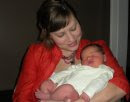 I had a great time co-teaching our Epiphany University class called "Can I Call My Neighbor Friend? Muslim/Christian Dialogue" I feel like we engaged in really good conversation about how we as Christians "can love our neighbors as ourselves." Hearing my co-teacher Ruth Nelson's personal passion, learning from Dr. Mark Swanson chair of Muslim-Christian Relations at the Lutheran School of Theology at Chicago and dialoguing with four Muslim neighbors is a step in the right direction. I am encouraged to hear how people around the world are doing the same on a much larger scale. I particularly like the idea of a class called "Sacred Envy," I'll have to keep that in mind...
I had a great time co-teaching our Epiphany University class called "Can I Call My Neighbor Friend? Muslim/Christian Dialogue" I feel like we engaged in really good conversation about how we as Christians "can love our neighbors as ourselves." Hearing my co-teacher Ruth Nelson's personal passion, learning from Dr. Mark Swanson chair of Muslim-Christian Relations at the Lutheran School of Theology at Chicago and dialoguing with four Muslim neighbors is a step in the right direction. I am encouraged to hear how people around the world are doing the same on a much larger scale. I particularly like the idea of a class called "Sacred Envy," I'll have to keep that in mind...In December 2009, Melbourne, Australia hosted the Parliament of World’s Religions, a global dialogue of faiths. Sister Joan Chittister, longtime champion of peace, human rights and gender equality attended the Parliament and spoke with AWID (Association for Women’s Rights in Development) to share her perspectives on what the Parliament proceedings mean for women. Here are two responses of hers from a much longer interview...
by Masum Momaya
Sister Joan what was the personal highlight of the Parliament for you?
Sister Joan Chittister: The Parliament of the World’s Religions is a living icon for which we all hope. It is a diorama of many peoples, all of whom express a different face of the Divine, all of them united in holiness, in common commitment to the entire human community, and all knowing themselves to be one in God. This was the highlight for me. Just watching this flow of goodness sweeping back and forth across the great foyer and down the halls of the Melbourne Conference Center was a kind of spiritual vision for me. To see this is to know that wars of religion are both a scandal and an impossibility and that the Parliament is a holy and necessary step to a future without religious wars or theocratic oppression.
Sister Joan what were some "takeaways" that stood out to you in terms of dialogues?
S.J.C.: I participated in a panel on "Sacred Envy." Each of us panelists was asked to describe what we loved about our own religion and about each of the others. Then we were permitted to ask one another the question that most plagued us about another of the religions represented there. It was an impacting moment to hear real questions asked—about freedom of religion in theocratic states or the connection between religion and politics, for instance—and answered without defensiveness and with real depth. It proved the possibility of real interfaith discussion when the discussants talk openly and honestly about the struggles of the faith rather than either defend or decry the concerns of the other. It modeled an important role for religious figures in the modern state.

No comments:
Post a Comment